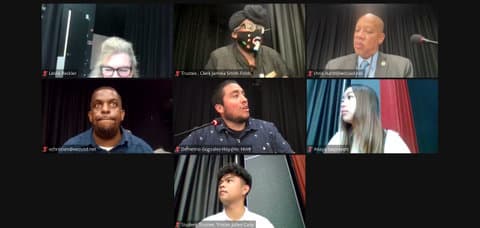
24 Aug Summer Programs Help Students Stay Engaged, Earn Back Credits

(Screenshot captured by Samantha Kennedy / The CC Pulse)
By Samantha Kennedy
After the first week of the school year, the West Contra Costa Unified School District showed how it supported students over the summer.
The WCCUSD school board received a presentation Wednesday on the district’s summer programs: expanded learning, summer school and an extended school year.
Enrollment in summer programs reached its highest in several years and allowed the district to put students in a better position to succeed.
Gabriel Chilcott, WCCUSD’s director of curriculum, instruction & assessment, said some programs were offered for the first time and brought in a lot more students. The district offered a hybrid Edgenuity program, an online learning platform students can use for credit recovery, for the first time, which allowed over 2,000 credits to be recovered by high school students.
Credit recovery during summer programs gives students another chance to meet the district’s graduation requirements and college entrance requirements. Credits lost by students due to failed classes and other substandard grades can be recovered in summer programs.
Fully in-person high school sites also saw over 2,000 credits earned by students. Despite a decrease in the initial enrollment for the traditional summer school program, most who remained enrolled received a passing grade to earn credits.
But while the district prioritizes the academic progress of its students during the summer, it’s not the only thing that matters.
Summer programs also allow students to remain engaged in an educational setting and with their peers throughout the year.
Guthrie Fleischman, interim director for the district’s Special Education Local Plan Area, said programs like the expanded school year, which is offered to students with disabilities, give students the opportunity to further socialize and maintain the skills they’ve learned. Fleischman said students could participate in activities such as cooking and sharing a meal to complement academic progress.
In addition to providing services for students with disabilities, the district also targets other underserved populations when doing summer program outreach. English learners, foster youth and low-income students are some of the groups the district prioritizes.
District data shows that underserved student populations, such as low-income youth and English learners, are consistently underrepresented in graduation rates and academic standards met. Students with disabilities and foster and homeless youth are overrepresented in chronic absenteeism.
Clerk Jamela Smith-Folds asked if the district was tracking the progress of students in summer programs and how it translates into the regular school year.
Chilcott said the district uses several tools to track student progress. For elementary school students, some teachers began to use Educlimber, an interactive student data tracking tool, to monitor a student’s progress. Other programs are used to monitor progress in elementary literacy.
The next WCCUSD school board meeting is Sept. 6.






No Comments